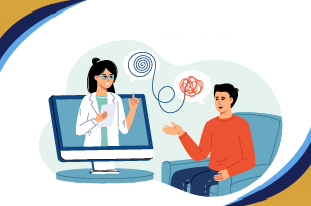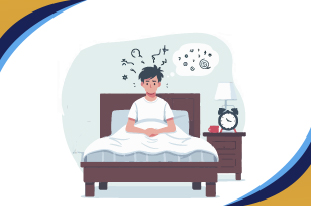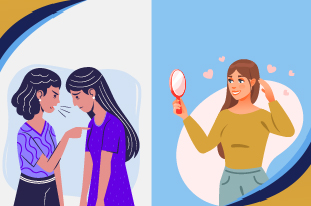Dizziness is a commonly experienced and distressing physical state. When a person experiences dizziness, they may also experience the signs of lightheadedness, wooziness, and they may also feel a bit unsteady. This feeling is not the same as things spinning around you, this is called vertigo. Dizziness and vertigo are usually treated with the same therapeutic approaches but they both are different things with different meanings. Dizziness typically means when a person feels lightheadedness or a feeling that you are losing your balance. Vertigo is entirely based on the sensation of spinning or moving around. A rough estimate shows that almost half of adults visit their healthcare providers at some point of their lives for sharing their health concerns linked with dizziness such as Major Depressive Disorder. Moreover, spells of dizziness are often temporary and rarely a sign of serious medical condition including acute stress.
If you desire to learn more about the link between “Anxiety” and “Dizziness”, Why does anxiety cause dizziness?”, and “How to stop dizziness from anxiety?”, then continue reading this blog post.
Common Triggers Of Dizziness
While treating anxiety-induced dizziness, what matters the most is to control the root cause of dizziness to get rid of the issue for a longer period of time. Therefore, there is no single cause of dizziness. Here are some of the common triggers of dizziness:
-
- A person can experience dizziness if they change their body position
- It can be due to substance abuse
- Another common reason can be side effect of a medicine
- Dehydration in the body
- Can be due to reduced blood sugar in the body
- Health issues that have a impact on the inner ear
- Medical conditions such as vision, and neurological conditions etc
- Anxiety
- Depression
Read More: Understanding Anxiety Tics: Signs, Causes, And Possible Treatments
The Connection Between Anxiety And Dizziness
Many people are not aware of the fact that dizziness and anxiety are linked together and can cause one another. Now, what is the reason behind the science of anxiety causing dizziness? It is the fight or flight response of a person’s body.
You might wonder, “How to stop anxiety dizziness?” When a human body senses a threat, naturally the fight and flight response triggers. This is the process that helps a human body to experience several physiological changes in the body that basically prepares the body to escape from the present danger. However, the fact is that these changes happen to ensure that we survive the danger and in some cases these can also feel distressing. One of these distressing feelings is experiencing dizziness. In addition, the fight and flight response results in heavier breathing that is much shallower. This is beneficial in running to prevent a threat. Moreover, it leads to the feelings of hyperventilation as well in which our body takes in oxygen faster and then it uses it up and allows us to exhale carbon dioxide faster than the rate it is normally produced in. Here is the answer to your major concern “Why does anxiety make you dizzy?” This imbalance in the levels of gases leads to fluctuations in the bloodstream and causes a person to feel dizzy.

As anxiety can lead to dizziness, likewise, dizziness can cause anxiety as well. Let’s suppose, you see something that makes you feel dizzy, you will naturally feel anxious as well due to the fear that someone is watching or that they will make fun of you etc. In fact, this chain is so dangerous that it can lead to more complex situations like “Panic Attacks”.
What Is The Duration Of Anxiety-Induced Dizziness?
As every person is different, the same is the case with the duration of anxiety induced dizziness they face. Now, there can be several factors that distinguish the duration of time in each person experiencing anxiety induced dizziness such as a person’s physical health. Their coping styles, the intensity of their anxiety, and whether they are undergoing any treatment or not.
Now, many people think about this “Can anxiety make you dizzy?” and if yes, then “Can anxiety cause dizziness all day?”. A rough idea of the duration of anxiety induced dizziness is, for some people it can be just a few seconds to minutes. While, for others it can last for days, or usually several hours. However, in some cases, some people also experience constant dizziness for several days, weeks, and even extended to several months. But, this condition is mostly seen in people suffering from a condition that is associated with anxiety disorders known as persistent postural-perceptual dizziness (PPPD). An important thing to note is that it is always advised to consult a healthcare provider if you experience signs of anxiety induced dizziness. Moreover, if this anxiety induced dizziness hinders your day-to-day activity then it is best to meet a professional as soon as possible.
Managing Dizziness Signs
Experiencing dizziness can be distressing and a cause of concern for the sufferers. It can lead to However, you can also manage it with some useful techniques. Such as:
-
Sitting or Lying down:
When you sit or lie down, your body naturally stabilizes and prevents any accidents. Moreover, if a person lies down, they will experience a sudden increase in their blood flow reaching to the brain. This increase in the blood flow leads to reduction in dizziness in cases where dizziness is caused due to low blood pressure.
The science behind it is that when you feel dizzy, your balance can be affected, and can lead to an increase in the chances of falling down. You can prevent it by having someone in your surroundings help you sit down safely.
Read More: A Guide to Understand Anxious Attachment
-
Hydration:
It is a fact that 60 percent of our body is water, and thus maintaining this level of water is vital. But, how can you maintain this level of water? The simple answer to this concern is drinking excessive fluids to ensure your body is not dehydrated. Moreover, this hydration will promote a healthy brain functioning and stabilization of blood pressure. A rough advised quantity for males is around 15.5 cups of water on a daily basis and for females it is 11.5 cups. Furthermore, ensure to have a good water intake if you live in a hot environment or you are an athlete or workout.
-
Regular food intake:
Keeping a check on your eating habits is essential if you desire to prevent feeling dizzy from anxiety. It is vital to maintain a normal blood sugar level to prevent dizziness and lower levels of blood pressure. The secret to maintaining the blood sugar level is to eat small, repeated meals round the clock. In this way, you can balance your body’s blood sugar level. Moreover, always prefer a balanced diet that consists of small portions of all the essential nutrients such as proteins, nutritious fats, and necessary carbohydrates to cater with any negative fluctuations in your blood sugar levels.
Therapeutic Approaches To Treat Anxiety Induced Dizziness
For now you have learnt about some simple ways to manage anxiety induced dizziness but for a long term solution of signs of anxiety induced dizziness, consider seeking professional help. Some of the commonly applied treatment methods are:
-
Medication management:
The first preference of mental health experts in treating signs of anxiety induced dizziness is prescription of psychiatric medications. These particular medications are proven to be helpful in treating signs of ADHD, and acute stress as well. These can be antihistamines, antiemetics, some migraine medications, benzodiazepines, and fluid and electrolyte therapy.
-
Vestibular rehabilitation therapy (VRT):
As the name indicates this therapy is related to the ear. Such type of therapy is usually implemented to treat dizziness occurring due to the inner ear issues or disorders associated with balance. As per a study conducted the pattern of VRT includes some exercises that typically aids in retaining the brain to assimilate alterations in the balance and movement (Bayat et al., 2020). Moreover, it is also said to treat mood fluctuations leading to mood disorder.
-
Psychotherapy:
Another common yet effective therapeutic approach is psychotherapy particularly cognitive behavioral therapy (CBT). The plus point of this therapy is that it has a proven strong history of treating Generalized Anxiety Disorder and depression. This therapy works by enhancing self awareness of one’s thought process and then picking out the negative ones to change them into positive ones.
-
Changes in lifestyle:
Now, therapy and medication work best and show their results effectively when combined with healthy lifestyle choices such as yoga, meditation, and some gentle exercises.
Read More: Social Anxiety Disorder Treatment: What To Know?
Conclusion!
Anxiety can be extremely overwhelming for the sufferers. But, the intensity of distress increases when this anxiety causes dizziness in a person or vice versa. Therefore, if a person experiences anxiety due to dizziness, then it should be treated as soon as possible as it can lead to several other mental health issues as well such as specific phobia and BipolarDisorder etc. Mental health experts treat this issue with certain therapeutic approaches such as CBT, psychiatric medications, VRT, and some lifestyle changes. Therefore, if you think you are facing anxiety and dizziness, and looking for answers for “How to stop feeling faint from anxiety?”, then now is the ideal time for you to get in touch with telehealth services of Orange Coast Psychiatry.
























